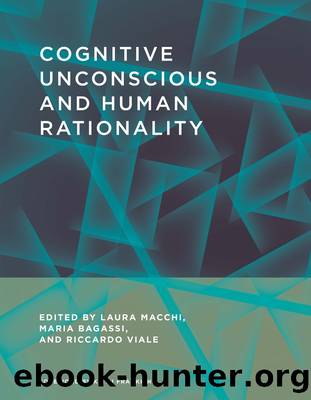Cognitive Unconscious and Human Rationality by Laura Macchi Maria Bagassi

Author:Laura Macchi, Maria Bagassi
Language: eng
Format: epub
Publisher: MIT Press
Published: 2016-03-18T00:00:00+00:00
Impersonal Performatives
Having distinguished deontic from causal contents in conditional rules, I now wish to make a more specific distinction between two subtypes of deontic content, namely impersonal rules that concern a class of people rather than a specific individual. Institutional deontics such as Taxpayers who donate to charity are permitted to claim a tax rebate (Bucciarelli & Johnson-Laird, 2005) may be considered to be forms of âsocial lawsâ (Cosmides, 1989) that differ from âsocial contractsâ proposed between two individuals, for example, If you wash my motorcycle then you may ride it (e.g., Fiddick & Grafman, 2008). Such social contracts are often based on deals made by two individuals on a specific occasion, such as a wife proposing to her husband, If I prepare the dinner, you must take the children to the zoo on Sunday (see Legrenzi, Girotto, & Politzer, 1996, for a comprehensive theoretical analysis). In contrast to social contracts that refer to such specific deals, institutional deontics refers to formal, impersonal rules issued by an authority, such as If you are licensed by the District, then you may sell hotdogs on the Mall. Here the âyouâ can be read impersonally, and as applying to all people who possess this license. Institutional deontics of this kind are likely to be found in rule books produced by formally constituted social groups (nations, companies, or clubs) and are often expressed using formal rules that are expressed in the third person. Unambiguous institutional deontics are often phrased in the language of universal laws and regulations, such as Passengers of international flights have the duty to hold an identity card. They have the characteristics of laws (Hart, 1961) in that they are not addressed to a specific person, they are standing orders independent of any particular time with sanctions for violators, and they can only be felicitously established as a rule by an authority.
Download
This site does not store any files on its server. We only index and link to content provided by other sites. Please contact the content providers to delete copyright contents if any and email us, we'll remove relevant links or contents immediately.
The Art of Thinking Clearly by Rolf Dobelli(10455)
Mindhunter: Inside the FBI's Elite Serial Crime Unit by John E. Douglas & Mark Olshaker(9324)
Change Your Questions, Change Your Life by Marilee Adams(7761)
Nudge - Improving Decisions about Health, Wealth, and Happiness by Thaler Sunstein(7694)
Mastermind: How to Think Like Sherlock Holmes by Maria Konnikova(7324)
The Power of Now: A Guide to Spiritual Enlightenment by Eckhart Tolle(5760)
Men In Love by Nancy Friday(5234)
Altered Sensations by David Pantalony(5094)
Factfulness: Ten Reasons We're Wrong About the World – and Why Things Are Better Than You Think by Hans Rosling(4737)
The Confidence Code by Katty Kay(4251)
Thinking in Bets by Annie Duke(4218)
Man and His Symbols by Carl Gustav Jung(4131)
The Worm at the Core by Sheldon Solomon(3486)
Why Buddhism is True by Robert Wright(3447)
Liar's Poker by Michael Lewis(3442)
Three Women by Lisa Taddeo(3425)
The Inner Life of Animals by Peter Wohlleben(3311)
Descartes' Error by Antonio Damasio(3271)
How Music Works by David Byrne(3261)
